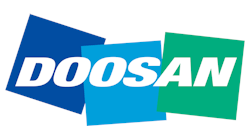Good is pretty good until it is no longer good enough. Then you need better-and you need it right now.
That’s exactly what Butch Reinert discovered. The superintendent for Heard Concrete, a full-service concrete construction company, had a serviceable dual-plane grader-control system that was producing good results. The Chesapeake, VA-based company specializes in commercial cast-in-place concrete and tilt-up work-employing approximately 150 employees and having successfully poured millions of square feet of concrete since its founding in 1989.
“We had a system that was probably 15 years old,” he says. “Maintenance was becoming an issue, and we simply decided we needed to update and upgrade. So we had discussions with our supplier (Atlantic Laser Supply) to see what might be the best fit for us. In talking with them, we got a strong feeling that this system would do what we wanted and needed it to do.”
“This system” is the Topcon System 5, featuring laser dual-elevation grade control. “You have to love its ease of setup and what it gives in terms of being able to make grade changes on the fly,” Reinert says. “With the older systems, changing slab gradings could take significantly more time and drive higher expense. With this system, you’re literally punching a few buttons on the console and the computer takes over the process for you-quickly and accurately.”
The new system is being put to good use on a current, major project for Heard Concrete-a 750,000-square-foot expansion project that will house a printer cartridge production plant for Canon in Newport News, VA. Heard Concrete is working on behalf of lead contractor Clancy & Theys Construction Co. on the expansion project.
“The system is doing a great job for us,” he says. “We’re running it on a Leeboy Motor Grader 635B. We are able to do large pours while keeping our yields down to 1%. When you pour slabs of this size-6 inches-you have to grade the stone down to a specific grade. From a cost standpoint, the more precise we get the stone grade, the better for us and for the customer. With this equipment, you can get it almost perfect.”
The project, which began in June 2008, was completed in April 2009 and will be brought in ahead of schedule and under budget. “Because of its size, we have broken this particular project down into 20 pours,” he says. “Twelve of those were major pours, involving up to 60,000 square feet each. We are very pleased with the performance. And if we can continue to get what we’ve gotten out of this machine, we will absolutely be using them even more in the future.”
The system provides “amazing precision,” Reinert says. “If a specific section of slab should take 1,000 yards-with this technology-I can pour it and be within 10 yards. I know it’s possible because I’ve done it time and again on this job. Our old system did fairly well. But this system does an even better job. It’s more precise, and it’s faster and easier to set up and make quick changes-and that saves you money.”
Randy Blain with Atlantic Laser concurs. “They actually have two identical graders,” he says, “one with the older system from another manufacturer and the new System 5 on the other grader. They were running them side-by-side on the project site, and the grader with the System 5 was lapping the other grader every 10 minutes. That was impressive.
“The setup and use is so much faster and more efficient. Basically, with the System 5, you set up the laser, get the blade set on the final, finished grade you need, adjust the receiver and flip into automatic mode-with the system controlling the hydraulics.”
Reinert says his grader operator “loves the system. As an operator, you pride yourself on how much you can get done and how well you can do it. This enables them to do both-the how much and the how well-at optimal levels.”
While its use on the Canon expansion project has been primarily a standard grading application, Blain says, “It also can be outfitted with an option to accommodate slope work. That’s obviously not as critical when you’re primarily doing flat pad work. If you were doing roadwork where there were crown and slope needs, it would be an important capability to have. But Heard Concrete does a lot of flat pad work, and the System 5 is a perfect fit for that type of work.”



